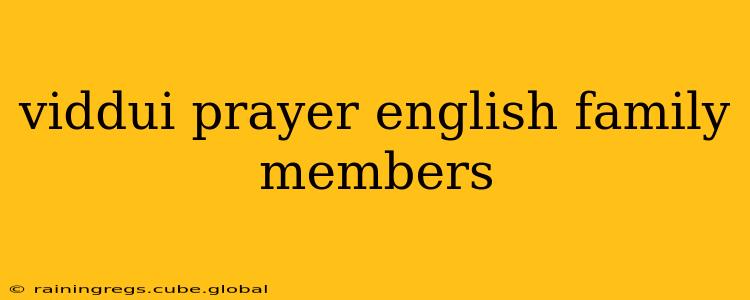Viddui Prayer: A Guide for Families
The Viddui prayer, a powerful confession of sins recited during Jewish services, particularly on Yom Kippur, holds deep meaning for individuals and families alike. While often performed individually, its message of repentance and seeking forgiveness resonates deeply within a family unit, fostering connection and strengthening bonds. This guide explores the Viddui prayer, its significance for families, and how to incorporate it into family traditions.
What is the Viddui Prayer?
The Viddui (וידוי) prayer, meaning "confession," is a central part of Jewish liturgy for the High Holy Days. It's a deeply personal reflection on one's actions and shortcomings throughout the past year. It lists various transgressions against God and fellow humans, acknowledging our imperfections and seeking atonement. The power of the Viddui lies not just in reciting the words, but in the sincere intention behind them – a genuine desire for forgiveness and a commitment to doing better.
How can the Viddui prayer benefit families?
For families, the Viddui prayer offers a unique opportunity for shared reflection and growth. By engaging with the prayer together, families can:
- Foster Open Communication: Discussing the meaning of the different sins listed can open up conversations about family dynamics, personal struggles, and the importance of mutual respect and forgiveness.
- Promote Shared Responsibility: The Viddui reminds us that our actions affect others. This collective awareness can strengthen family bonds and encourage a sense of shared responsibility within the family unit.
- Strengthen Family Bonds: Shared prayer often fosters a sense of unity and belonging. Engaging with the Viddui as a family can deepen emotional connections and promote a feeling of collective accountability.
- Teach Values: The Viddui provides a framework for discussing core Jewish values like honesty, compassion, and responsibility. This can be a valuable teaching moment for children and adults alike.
- Model Repentance: Parents can model the process of repentance and seeking forgiveness, teaching children valuable life lessons about accountability and personal growth.
How to incorporate the Viddui into family traditions:
There are several ways to make the Viddui prayer a part of your family's High Holy Day celebrations or even integrate it into regular family time:
- Read it together: Simply reading the prayer aloud as a family, pausing to discuss the meaning of certain passages, can be a powerful experience.
- Translate and explain: Using a translation with explanations can help family members of all ages understand the significance of the prayer.
- Discuss relevant situations: After reading sections, discuss real-life examples within the family that relate to the sins mentioned in the Viddui. This encourages self-reflection and fosters open dialogue.
- Create a family version: Consider creating a simplified or adapted version of the Viddui specifically tailored for your family, focusing on the sins most relevant to your family dynamics.
- Follow with acts of kindness: After reciting the Viddui, engage in acts of kindness or Tikkun Olam (repairing the world) as a family to demonstrate a commitment to making amends.
Can children participate in the Viddui?
Yes, children can participate in the Viddui, albeit in age-appropriate ways. Younger children can benefit from hearing the prayer read aloud and discussing its core messages of repentance and forgiveness. Older children can engage with the text more deeply, considering its meaning and relevance to their own lives. Adapting the language and complexity of the prayer to suit their understanding is key.
What are some common themes in the Viddui related to family interactions?
Many sections of the Viddui deal with interpersonal relationships, which are directly applicable to family interactions. These include:
- Speaking Lashon Hara (gossip): Talking negatively about family members to others.
- Judging others harshly: Being critical and unforgiving toward family members.
- Being dishonest: Lying or withholding the truth from family.
- Lack of respect: Disregarding the feelings and opinions of family members.
- Not showing kindness and compassion: Neglecting to support family members during difficult times.
By honestly reflecting on these areas and seeking forgiveness, families can cultivate stronger, healthier, and more compassionate relationships. The Viddui prayer, while traditionally a personal act of atonement, becomes a powerful tool for families seeking growth, healing, and a deeper connection with each other and with their faith.
